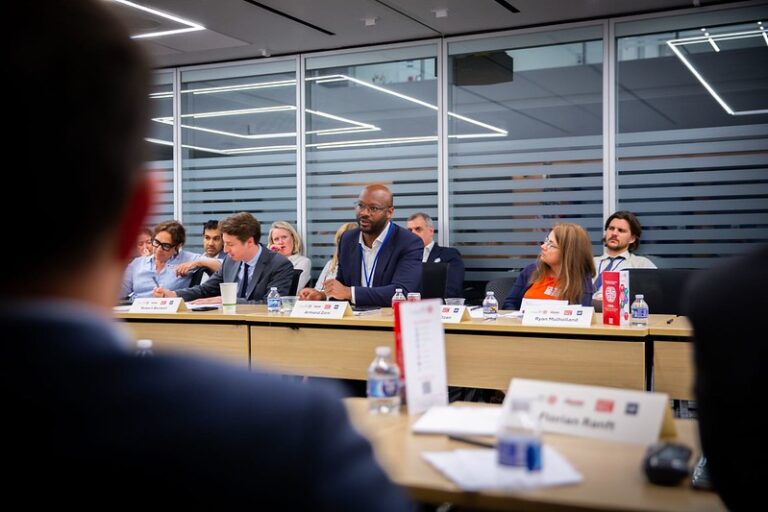Beyond mere electoral considerations – with European elections looming – it remains a crucial task for democrats to understand the reasons for the rise of far-right ideologies. Factors such as the perception of a migration crisis and a degraded public debate serve as catalysts for the proliferation of these ideologies. Notably, the polarising discourse against the LGBTQ+ community, public servants, NGOs, and pro-Europeans pushed by the far-right highlights the urgency of addressing societal divisions.
However, causes and connections are not as clear as they once were. For example, consider the diminishing correlation between unionism and voting for progressive parties. The traditional ties that once bound these affiliations seem to have eroded, prompting a reevaluation of the factors influencing political allegiance. Access to social infrastructure emerges as a pivotal factor, underscoring the need for comprehensive policies that extend beyond the ballot box.
Industrial policy as an antidote
Considering the territorial and geographical dimensions of social and political gaps, industrial policy – and its geopolitical dimension – might be a useful antidote, particularly in countries endangered by authoritarianism. Recent initiatives like the New Generation Funds and the Inflation Reduction Act in Europe and the United States strategically aim at fostering efficiency and productivity through localizing investments while fostering regional convergence.
My personal observation is, nevertheless, that there still exists, across some countries, a notable lack of coherence among energy, infrastructure, industrial, and social policies. At times, these sectors appear to be pursuing divergent goals, increasing the potential of antithetical outcomes. One illustrative example is the simultaneous pursuit of energy transition initiatives while heavily investing in grand infrastructures such as megaports. The misalignment in these policies raises concerns about their collective impact on overarching societal and environmental objectives.
The case of Portugal, particularly since 2016, serves as an illustration of a nation successfully navigating these policy complexities. Portugal’s strategic approach involves a multifaceted policy framework, including a deliberate policy on attracting investment complemented by a focus on wage increases, aiming to enhance the standard of living and promote equitable wealth distribution.
Portugal’s policy focus on specific industries with a targeted approach to economic development aligns with a broader strategy that involves looking at value chains and nurturing a knowledge-based economy. Portugal’s policymakers recognize the importance of territorial dispersion in industrial investments. Instead of concentrating economic activities in specific urban centers, there is a deliberate effort to spread industrial investments across the entire geographical expanse of the nation. This is streamlined with an emphasis on bureaucratic agility.
However, despite these commendable efforts, a critical concern arises from the potential exacerbation of wealth inequality. The observation that Europe and America are making the rich richer underscores the need for a concerted effort to socialise rewards. This implies a call for policies that not only stimulate economic growth but also ensure that the benefits are distributed equitably, addressing the socio-economic divide and fostering a more inclusive society.
Bridging the gap from the bottom-up
At the last Progressive Governance Seminar*, I had the privilege of moderating a session that explored the urban-rural divide and discussed approaches to address social grievances and boost democratic participation in Europe and North America. One example is Placemaking Europe’s Cities in Placemaking program, which fosters public innovation to bridge divides across a selection of cities. The selection criteria for participating cities are a deliberate effort to challenge the status quo: favoring placemaking and innovation among mid-sized cities. While large cities are often at the centre of economic success and growth stories, innovation and economic policies more often than not neglect the potential of mid-sized cities and rural regions. In this context, the success stories from cities such as Wroclaw, Rotterdam, The Hague, and Budapest showcased the efficacy of progressive civil servants acting as mediators between politics and policies. However, a sobering reflection surfaced regarding the challenge of effectively communicating beyond the superficial rhetoric often associated with terms like inclusion, equity, and sustainability. The imperative for structural change in mid-sized cities and rural regions to bring about tangible improvements was emphasized.
Insights from panelists added depth to the discussion. In Sweden, economic divergence was identified as the primary gap in the country, urging a truthful discourse about left-behind communities. In Slovenia, an ideological divide is perceivable, even in traditionally open rural communities. To counter these divides, a new perspective that emphasises people’s well-being beyond urban environments, with infrastructure and access playing crucial roles in shaping political attitudes, is crucial. In countries like Greece, however, the primary divide is of demographic nature. Approximately 97% of the population is concentrated in a mere 3% of the territory, while numerous islands face significant challenges due to their dependence on the central government, limited resources, and isolation. Similarly though, countering this demographic tilt requires building up local resilience and ensuring access to public and social infrastructures with a bottom-up approach that involves local communities. Strategies should include decentralizing energy production, implementing universal basic income schemes at the local level, and fostering social innovation and participation.
Overall, the seminar challenged the prevailing idea of an urban-rural divide, positing it as primarily an economic divergence. This economic divergence, in turn, generates divides in perceptions of migration and climate policies. The imperative of equal living conditions across regions emerged as a central theme, necessitating a discussion on economic and societal access, encompassing not only physical infrastructure but also quality of life. The call for a dual-pronged approach, involving both top-down (infrastructure) and bottom-up (governance and social innovation) policies, echoed throughout the discussion.
However, challenges still lay ahead, including policy bottlenecks, the reconnection of people with economic opportunities, and the breaking of the vicious circle of discontent. Progress, it was argued, is intricately tied to access to opportunities and the ability to shape that access. In essence, progressive infrastructure must not only contribute to the economic prosperity of places but also foster a sense of security and well-being, transcending traditional notions of development. It is incumbent upon us to move away from the belief that more infrastructure is always better and forge a path toward sustainable and socially conscious decision-making in the development of places.





